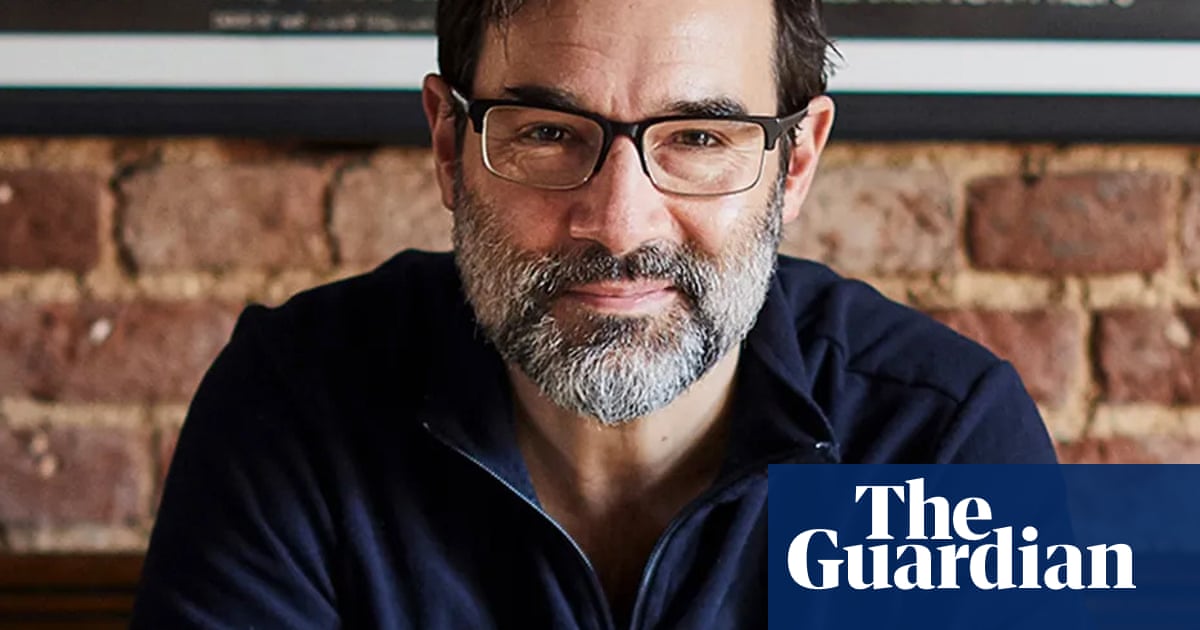One day Adam Buxton ordered two teas with oat milk from the trolley on the train. Unfortunately his came with cow’s milk and, because his need for vegan alternatives is apparently greater than his wife Sarah’s, he asked her to swap. Before Sarah had the chance to reply, the woman serving their drinks intervened, observing sensibly: “She might not want that one.” Buxton retorted with exaggerated gruffness: “She’s my wife, so she’ll have what she’s given!”
The comedian, radio and TV presenter recalls what happened next. Passengers shook their heads and looked at Sarah with pity and concern. Sarah sank mortified into her seat. The incident, Buxton writes, made him look “even more like the kind of controlling monster I had just parodied. But maybe,” he reflects, “a husband who makes a joke that lands so badly and embarrasses his wife as I just hadisa kind of monster. On the other hand, perhaps I’m right and everyone else is wrong.”
I was all set to hate this book, with its stupid, chummy title redolent ofRussell Brand’s bestsellerMy Booky Wook, and its cover emblazoned with Buxton’s mug in the manner now customary for celebrity memoirs. But much of it consists of Buxton parading his failures – jokes that misfire, TV pranks that end in a Brixton shop with someone threatening to punch him, and the author’s abiding fear he’s a talentless impostor – all endearingly contrary to the self-aggrandising Trumpian zeitgeist. True, Buxton rambles. There’s a very long section on the ideas he pitched to Channel 4 that were cruelly denied. One such proposal was a sitcom in which David Bowie’s characters – the laughing gnome, Ziggy Stardust, Major Tom, the junkie Pierrot and so on – shared a flat. Buxton notes that in 2006 Bowie made an advertisement forVittel mineral waterwhich, he muses, bears a remarkable likeness to his failed pitch. Did Bowie nick his idea? It seems unlikely but, now the thin white duke is dead, we may never know for sure.
There are also too many passages about him hanging out with musical heroes Radiohead and Travis. More entertainingly, he and Joe Cornish, fellow host of TV and radio’s The Adam and Joe Show, get menaced by a drunken Mark E Smith (late frontman of The Fall) who marches the pair to a cashpoint to get the £200 they promised him in order to appear in one of their daft skits.
The book is padded out with a spreadsheet of arguments he’s had with long-suffering Sarah. For example: “Subject of Argument: Wife leaving dirty plates and coffee mugs by the sink to clean later. Buckles’ point [Buxton calls himself Buckles throughout. Just accept it]: ‘I always think it’s better to clean as you go.’ Sarah’s response? ‘I always think it’s better to fuck while you off.’ Sarah 1, Buckles 0.”
Oddly, these digressions are mostly charming. And a letter to his mother, who died during Covid, at the end of the book, had me welling up. “Thanks,” he writes, “for lending me your makeup and showing me how to apply it, not only when I was afflicted by volcanic eruptions of bad skin as a teenager but also when I just wanted to look more intense and interesting.”
That I was charmed at all is more surprising since Buxton is not relatable. He went to Windlesham House School where he met mockney herbert and future film director Guy Ritchie and to Westminster where he was contemporaneous with future posh TV prankster Louis Theroux. He found his calling at Cheltenham Art School where he made silly films for his degree that, cannily, he parlayed into the TV shows with which he and fellow Westminster alum, Cornish (AKA Cornballs) made their name in the 90s and noughties. They dressed up, pranked shoppers, satirised crap telly like Richard and Judy, painstakingly made a little model of the doomed ship for their parody Toytanic – as if they were Peter Pans with Blue Peter badges.
Buxton is now in his 50s and his line of work, so far as I can tell, consists of asking infantile questions of celebrities and seeing if they will play nice or be dicks. He once asked Paul Weller, live on Radio 2: “Does anyone ever say to you, ‘Paul Weller, Weller, Weller. Oooh! Tell me more! Tell me more!” To which the glum musician replied: “Was that supposed to be funny?”
I found Buxton’s self-deprecation endearing right up to the point that I realised he’s probably getting a huge advance for offloading his insecurities. And yet, he has written a celebrity memoir that does something extraordinary: it manages to be worth reading. Though I suspect not everyone – the modfather among them – will agree.
I Love You, Byeee: Rambles on DIY TV, Rockstars, Kids and Mums by Adam Buxton is published by Mudlark (£22). To support the Guardian, order your copy atguardianbookshop.com. Delivery charges may apply.
